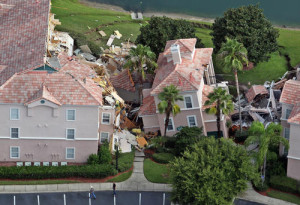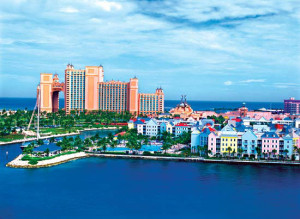The Insurance Issue for Summer Bay Resort Timeshare Owners
Friday, August 16, 2013

This week got off to a dramatic (and traumatic) start when a sinkhole caused the collapse of two adjoined buildings and the condemning of another one at Summer Bay Resort, just outside of Orlando, Florida. (See: Is the Orlando Summer Bay Resort Timeshare Sinkhole Growing?) For the guests and owners at Summer Bay Resort, all are physically unharmed and it appears they will be, for the most part, fiscally unharmed as well.
Most importantly, all occupants of the building were safe. This fact alone seems amazing considering that the event became apparent around 11 PM in the evening, meaning that some occupants were already sleeping, others were in varying stages of preparing for bed, and many had sleeping children to roust and gather before evacuating. One woman was even enjoying a relaxing soak in the tub when the room around her began to collapse.
The staff at Summer Bay Resort deserves tremendous praise for its successful evacuation efforts and effectively dealing with the relocation of guests and timeshare owners who had lost everything they had with them. But the problems facing Summer Bay Resort vacationers didn’t end when the ground stabilized.
Displaced guests were without medications, eyeglasses, car keys, wallets, and credit cards. There was a temporary interruption of utilities that impacted other buildings on the property. Guests and owners throughout the resort were awakened, frightened, and were no doubt, peppering the Summer Bay Resort staff with anxious questions. And then there was the ongoing stream of news coverage, reporters, helicopters, repair crews, police, firefighters, and other emergency workers called onto the scene. This was a summer vacation gone wrong in the worst way for many people.
But when the dust, literally and figuratively settled, the obvious question on everyone’s mind is: who pays when a sinkhole swallows you timeshare, or it is damaged or destroyed by lightning, flooding, wind, tsunami, or any other type of natural disaster?
The answer to this important question can vary significantly, depending upon the resort at which you own timeshare and the type of disaster. This blog post looks only at the Summer Bay Resort sinkhole situation.
Who Picks Up the Cost When a Natural Disaster Impacts Your Timeshare Resort?
In the case of Summer Bay Resort, let’s put this situation into perspective. This resort property is very large occupying some 3,000 acres with approximately 900 timeshare units, vacation houses, and a hotel located on the resort grounds. Most of the more than 4,500 guests who were at the resort this week, were unaffected by the sinkhole and the resort has experienced few cancellations for upcoming weeks.
Timeshare owners at Summer Bay who own units in the buildings that were impacted, report that the resort management is telling them insurance will cover damages from the sinkhole. This should prove to be reliable information, backed by recent legislative changes pertaining to Florida sinkholes.
Florida Sinkhole Legislation Changed
Sinkholes were already a hot topic in Florida this year, even before the earth opened up the 120-foot wide chasm on the resort grounds of this popular Florida vacation ownership resort. Last year, Florida legislature approved a law defining that any catastrophic collapse caused by a sinkhole is fully covered under Florida property insurance. This is great news for the timeshare owners at Summer Bay Resort.
It is not such great news for other Florida timeshare owners and owners of residential property whose timeshare, homes, garages, or other structures are damaged over time by slow or small shifts in the earth. The new law clearly states that there must be an “abrupt land collapse, structural damage, and a condemned property.” However, for purposes of this blog post, let’s consider only the type of collapse and damaged experienced by Summer Bay Resort.
Many Florida insurance experts are commenting to the press that the resort’s property and casualty insurance should cover the loss and should prevent the need for any related special assessments against the timeshare owners.
Breaking Down the Insurance Issue for Summer Bay Resort Timeshare Owners
Timeshare owners and guests directly effected by the sinkhole, experiencing the loss of personal property, and who have insurance that covers their residence elsewhere, will likely find that their homeowners insurance also covers their personal property when they are traveling. Others who took out vacation insurance will probably find aspects of their time or personal property loss covered by their vacation insurance policy. And this is not to imply that personal property lost in the building collapse won’t be covered directly by the resort’s insurance that is covering this event. But some owners and guests may find they have additional types of insurance that they personally carry that also will benefit them in this situation.
Right now, Summer Bay Resort says it plans to rebuild the damaged buildings on some other part of its large property. So are the owners off the hook, for paying a special assessment or an increase in their maintenance fees?
Not necessarily. Insurance will cover the property as it was before the loss, plus depreciation, which is the difference in the cost today to replace items and property as compared to what it cost originally. But if the resort looks to update or upgrade the timeshare units in the rebuilding process, and there is added cost in so doing, that cost will be above any insurance coverage.
For example, what if the timeshare units being replaced had carpeting and the decision was made to update and upgrade to an engineered wood or other type of flooring that in the long run is more durable and perhaps more aesthetic? In that case, the insurance dollars allowed for replacing the carpet might fall short of the amount needed to switch to a more currently preferred type of flooring. This cost could logically be borne by the thousands of Summer Bay vacation owners, in an apportionment equal to the number of units or weeks they own and the size of those units.
The Bottom Line
Most Summer Bay Resort owners who have commented publicly on the sinkhole have expressed relief that no one was harmed and have shown great compassion for anyone who was directly part of this bizarre event. Yet a few have demanded that the resort “guarantee” this won’t happen at other buildings on the property.
Let’s let Summer Bay Resort, and all other hotels, timeshares, and vacation properties off the hook on this type of demand. No one can offer guarantees against natural disasters, nor should we expect them to try.
Assuming that a resort makes all reasonable efforts to protect its guests and timeshare owners, and that to any degree determined by logic or law, the resort structure and property are safe, stable, and functional, then the resort has done all it can possibly do.
Things happen. You can personally procure insurance to protect you against most of them, including inclement weather and loss of vacation. If your peace of mind is enhanced by knowing you are covered against all possibilities, then you should explore the options for the many types of insurances that are available.




